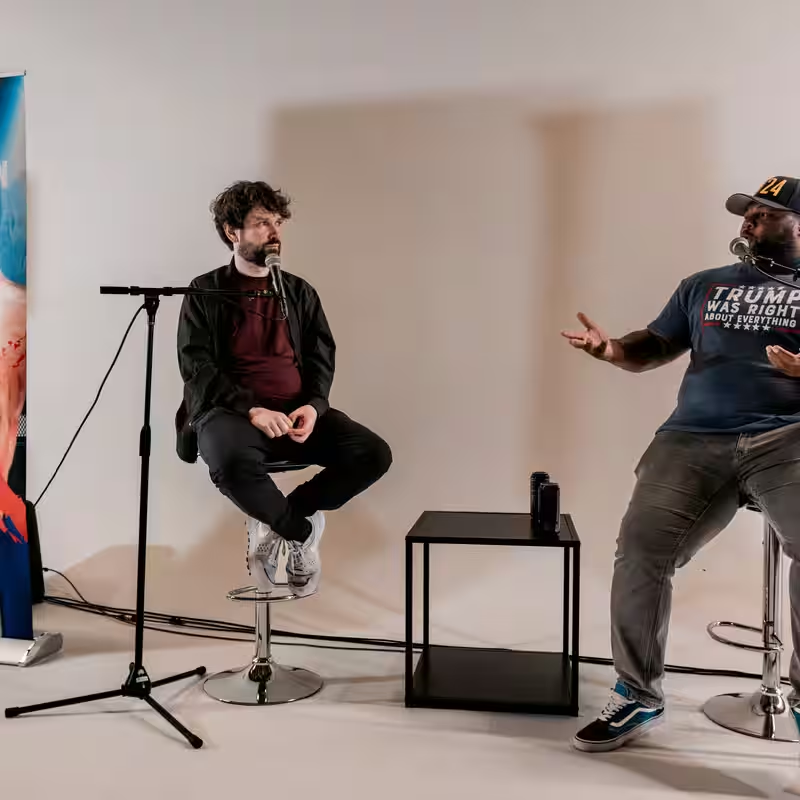For years, the right has dominated the digital debate scene—packing college auditoriums, racking up millions of views on YouTube, and turning figures like Charlie Kirk into political rock stars. Now, the left is stepping into the ring. From livestreamed bar brawls to sold-out anti-Trump tours, progressive debaters are betting that logic, passion, and a little showmanship can win over the algorithm—and the audience .
Why Online Debates Are Booming
In today’s attention economy, conflict sells. Platforms like YouTube, TikTok, and X prioritize emotionally charged content, and few formats deliver more drama than two people arguing politics face-to-face. Conservative influencers mastered this early: Steven Crowder’s “Change My Mind” table, Ben Shapiro’s rapid-fire takedowns, and Charlie Kirk’s campus showdowns became viral engines that shaped a generation of right-wing voters .
Now, Democrats are playing catch-up—but they’re doing it with strategy, not just slogans.
Meet the Left’s New Debate Warriors
Steven Bonnell—better known as Destiny—is leading the charge. With 850,000 YouTube subscribers and a recent “Anti-Trump Tour” that sold out in six cities, Bonnell blends calm logic with surgical precision. At a recent Los Angeles event, he dismantled a Trump supporter’s claim that the only mistake the former president made was conceding in 2020—drawing cheers from a crowd that paid $39 just to watch .
Then there’s Adam Mockler, 23, a rising star with 1.7 million YouTube followers. Mockler doesn’t shy from confrontation. On NewsNation’s new “Bar Fight” series, he debated Turning Point USA’s spokesman on political violence—and even lobbed a sharp insult at President Trump during a Nashville showdown. “I’m not aggressive by nature,” he told The New York Times, “but at some point, you have to punch back.”
Digital Duels: By the Numbers
| Platform | Top Conservative Debater | Followers | Top Progressive Debater | Followers |
|---|---|---|---|---|
| YouTube | Steven Crowder | 5.8M | Destiny (Steven Bonnell) | 850K |
| X (Twitter) | Charlie Kirk | 4.2M | Adam Mockler | 1.1M |
| TikTok | Candace Owens Clips | 3.5M+ | Dean Withers | 4.6M |
Why Democrats Are Late—but Not Out
According to Priorities USA, a Democratic super PAC, young voters are already watching debate content in droves—on par with beauty tutorials and finance advice. And they find it more “authentic” than traditional political ads. “It doesn’t feel like propaganda,” said Danielle Butterfield, the group’s executive director. “It feels like real dialogue.”
That’s why Democrats are shifting tactics: instead of building their own echo chambers, they’re infiltrating existing ones. Mockler appears on conservative shows. Bonnell debates Jordan Peterson and Ben Shapiro. Dean Withers, a 21-year-old progressive, went from 40 livestream viewers to 25,000—thanks to a breakout appearance on Jubilee’s hit series “Surrounded.”
The Risks of Fighting Fire With Fire
Not everyone is convinced. Noah Goldman, a grad student who attended Bonnell’s LA event, admits debates rarely solve policy problems—but says they’re necessary for survival. “If the other side punches first, you kind of have to punch back,” he said.
Even Dean Withers, now a TikTok star, worries the format can deepen division. “Debate content isn’t always benevolent,” he cautioned. “It raises questions about how we should even be having these conversations.”
Mainstream Media Joins the Fray
The trend isn’t just digital. CBS News, under new editor-in-chief Bari Weiss, plans a debate-style TV show. C-SPAN launched “Ceasefire,” pitting Rahm Emanuel against Mike Pence in its debut episode. The message is clear: whether online or on air, combat drives engagement.
Can the Left Build Its Own Charlie Kirk?
Michael Knowles of The Daily Wire puts it bluntly: “The online left is trailing years behind.” But he welcomes the competition. “Finally, the other side wants to get involved.”
For now, the left’s approach is less about dunking and more about dismantling—using facts, tone, and endurance. Whether that wins hearts in the long run remains to be seen. But one thing’s certain: the debate stage is no longer a red-state monopoly.




